Key takeaways:
- Feedback is a vital component of communication, serving as a catalyst for personal growth and improved relationships.
- Effective feedback enhances performance, fosters collaboration, and boosts morale when provided in a constructive and timely manner.
- Different types of feedback, such as affirming, constructive, and evaluative, can influence personal development positively when received and interpreted thoughtfully.
- Techniques for giving and receiving feedback, like focusing on specific examples and practicing active listening, are crucial for creating a productive dialogue.
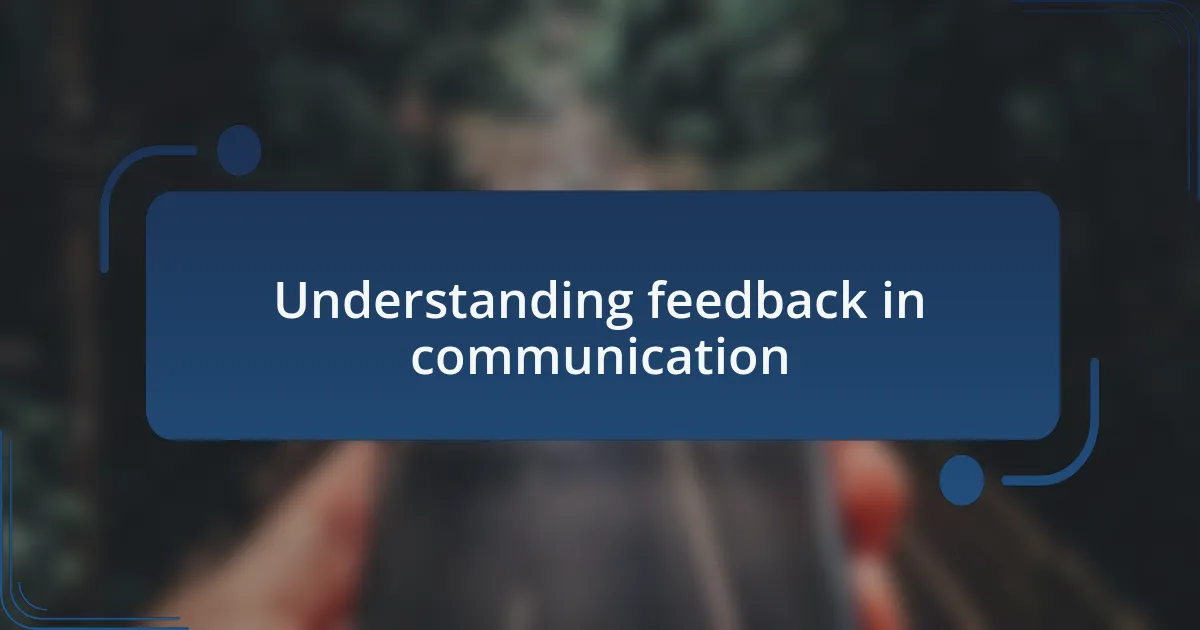
Understanding feedback in communication
Feedback is an essential part of any communication, acting as a bridge between the sender and receiver. I often think back to a time when I received constructive criticism on a project I poured my heart into. At first, my immediate reaction was defensive, but it turned into a pivotal moment for my personal growth.
Have you ever noticed how feedback can feel like a conversation between two minds? When I’m engaging with others, I see feedback as an opportunity for connection, rather than just a critique. This shift in mindset can transform the way I absorb critiques and use them to enhance not only my work but also my relationships.
Understanding feedback goes beyond simply receiving suggestions; it’s about interpreting and acting on them. There was a time when I struggled with this, feeling overwhelmed by various opinions. But I learned that taking a moment to reflect on feedback, asking clarifying questions, and integrating it constructively can lead to deeper collaboration and understanding. How do you navigate feedback in your conversations?
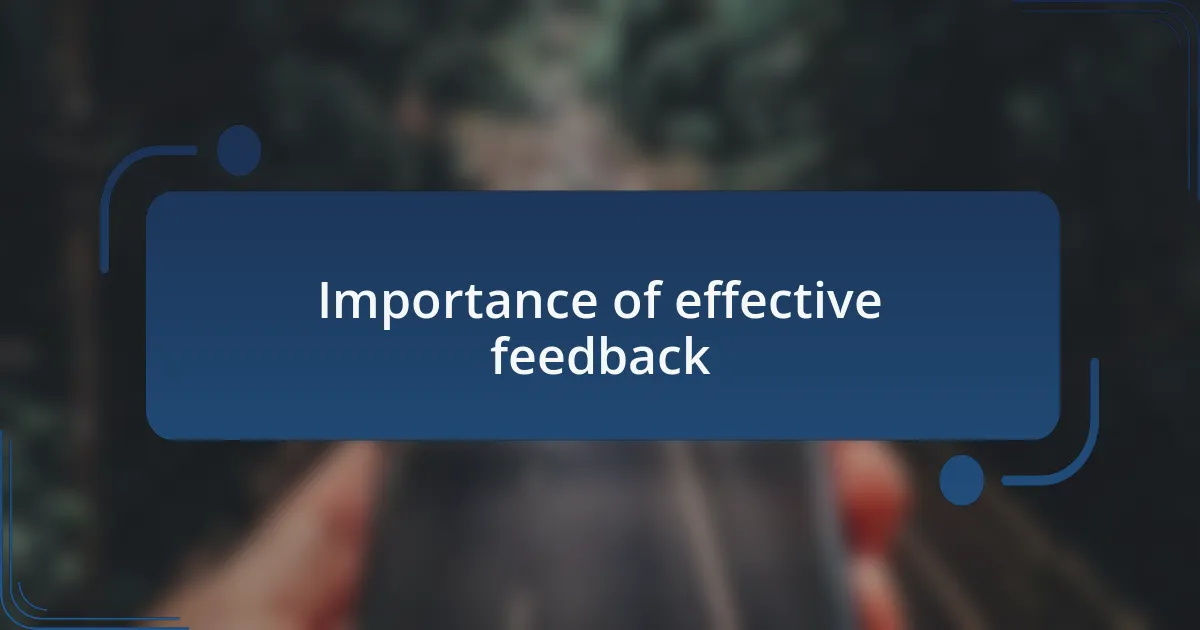
Importance of effective feedback
Effective feedback is crucial because it shapes growth and improvement. I remember a team project where my colleague offered insights that, at first, stung a bit. But embracing that feedback helped elevate the project beyond my expectations, illustrating that well-delivered critiques can be a catalyst for innovation.
When I think about feedback, it really results in enhanced performance and fosters collaboration. Have you ever been in a situation where you felt stuck, only to receive a perspective that turned things around? That’s the power of effective feedback—it invites diverse viewpoints and ignites better solutions by breaking down silos in communication.
Furthermore, timely feedback can also boost morale. I once witnessed a colleague’s confidence soar after receiving acknowledgment for their hard work, paired with constructive suggestions. This experience reinforced my belief that when feedback is both supportive and informative, it not only empowers the individual but ultimately strengthens the entire team’s dynamics.
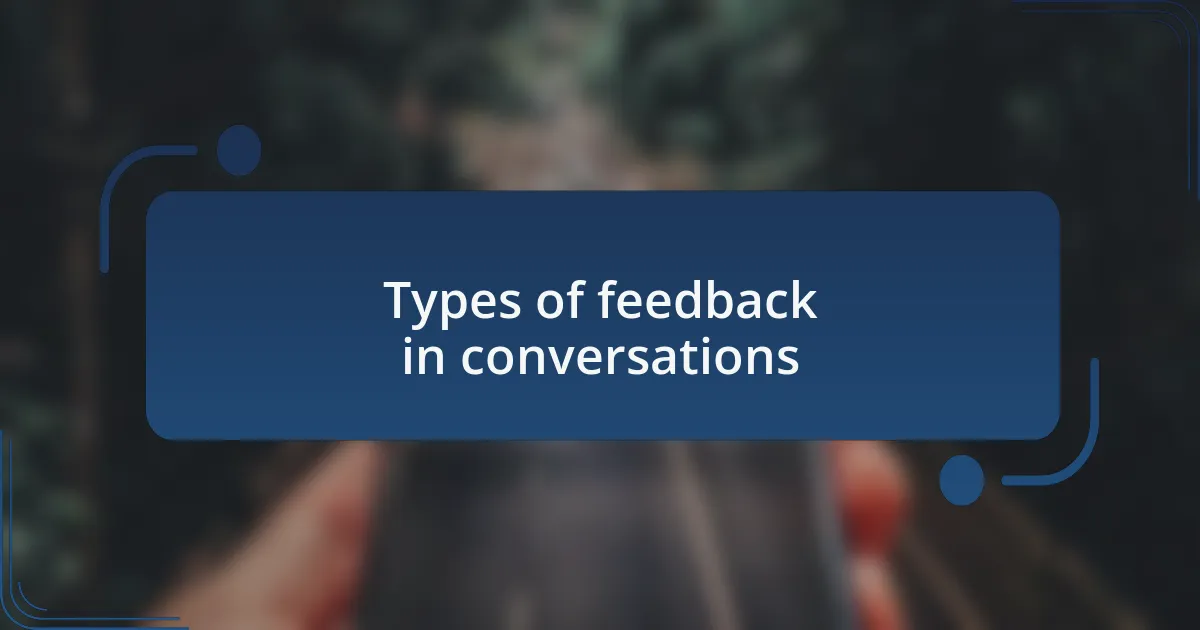
Types of feedback in conversations
Feedback in conversations comes in various forms, each serving a unique purpose. For instance, I often experience affirming feedback, which simply acknowledges good work or positive behavior. I remember a moment during a presentation when a simple “Great job!” from my peers shifted my entire focus towards building my confidence, making me eager to take on more challenging tasks.
Then there’s constructive feedback, which focuses on areas for improvement. I once received feedback on my writing that pointed out vague sections I hadn’t even noticed. While it felt uncomfortable at first, I realized that this type of feedback pushed me to refine my skills and ultimately make my writing clearer and more impactful, something I greatly value today.
Finally, there’s evaluative feedback, which provides a judgment based on specific criteria. Think back to a time when you received a performance review—did it leave you feeling motivated or deflated? In my experience, a balanced evaluation tends to inspire growth, especially when the reviewer combines positive insights with areas to develop. This balance helps create an atmosphere conducive to open conversation and continuous improvement.
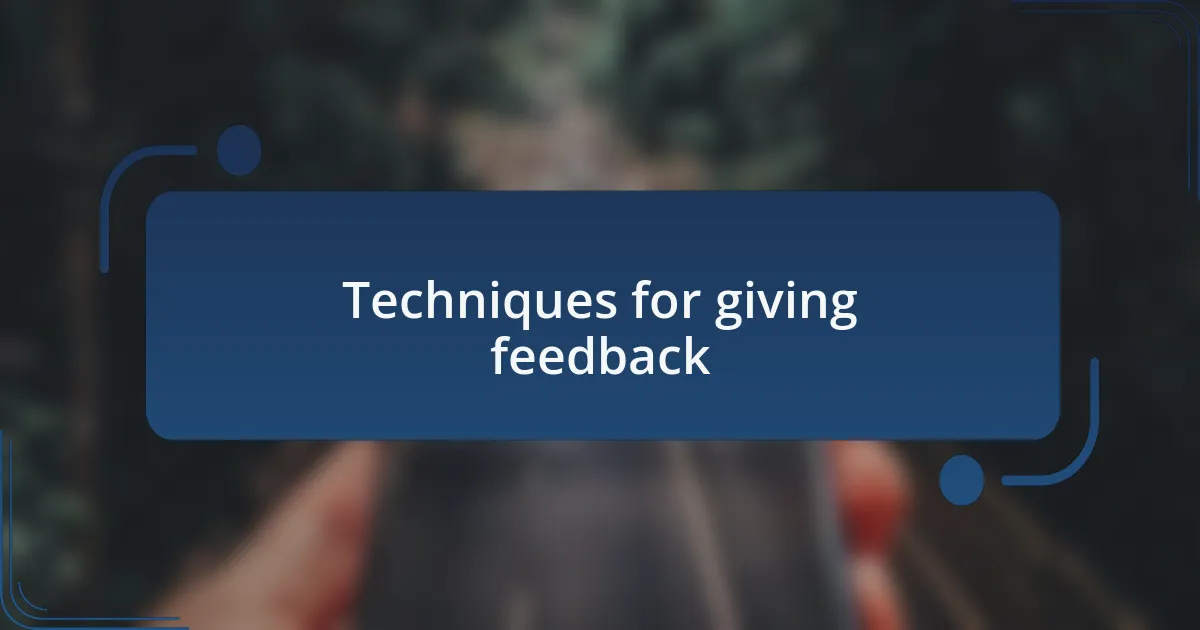
Techniques for giving feedback
One effective technique for giving feedback is to focus on specific examples rather than vague statements. I recall a time when a colleague told me my presentation lacked clarity, but it felt more like a critique than constructive advice. In contrast, when someone pointed out exactly which parts were confusing and suggested ways to rephrase them, I appreciated the clarity and felt empowered to improve.
Another approach is to frame feedback in terms of the impact it has on the team or project. For example, during a group project, I shared with a teammate how their last-minute changes affected our timeline. Instead of simply stating they were wrong, I expressed how the adjustments could compromise our deadlines. This created a dialogue about our workflow, making it easier to collaborate and find common ground.
Using the “sandwich” method can also be effective. I’ve found that starting with a positive comment, then addressing an area for improvement, and finally ending with another affirmation creates a balanced atmosphere for feedback. After receiving this kind of feedback from a mentor, I felt encouraged rather than overwhelmed. It’s fascinating how a little thoughtfulness in delivery can completely change the recipient’s perception of the feedback!
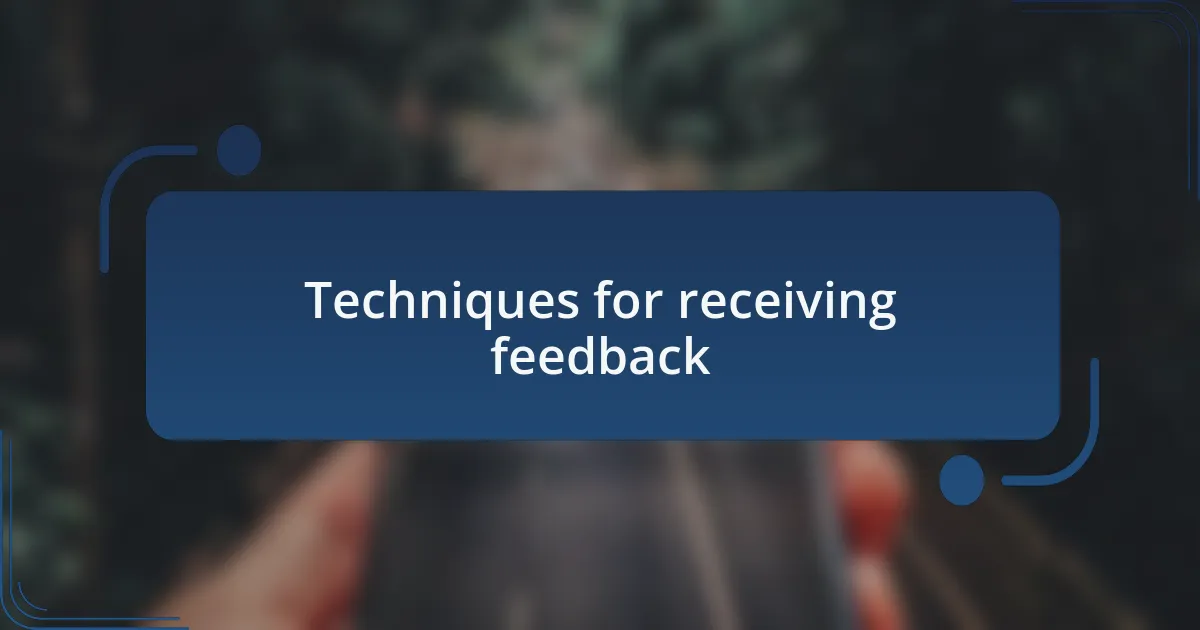
Techniques for receiving feedback
One essential technique I embrace when receiving feedback is to practice active listening. When someone shares their perspective, I make a conscious effort to absorb their words without immediately formulating my response. I remember a time when a supervisor detailed areas where I could improve my writing. Instead of interrupting or defending myself, I took a deep breath and focused on understanding their viewpoint. Doing this not only fostered a more open exchange but also helped me identify valid points for growth.
Another effective strategy is to ask clarifying questions. I find that when I receive feedback, my natural curiosity often prompts me to dig deeper. For instance, during a performance review, I was told I needed to be more decisive in meetings. Instead of feeling defensive, I asked for specific examples of when my indecision impacted the team’s progress. This turned a potentially uncomfortable moment into a constructive conversation, illuminating areas I hadn’t even considered.
Lastly, I always aim to reflect after receiving feedback. Taking a moment to process allows me to separate my emotions from the feedback itself. I recall an instance when I was advised to change my approach in client presentations. Initially, it stung a bit. However, after reflecting on the feedback over a couple of days, I realized it came from a place of wanting to elevate my skills. This shift in perspective made me eager to implement the suggestions and ultimately improved my presentation style. How has feedback shaped your journey in communication?
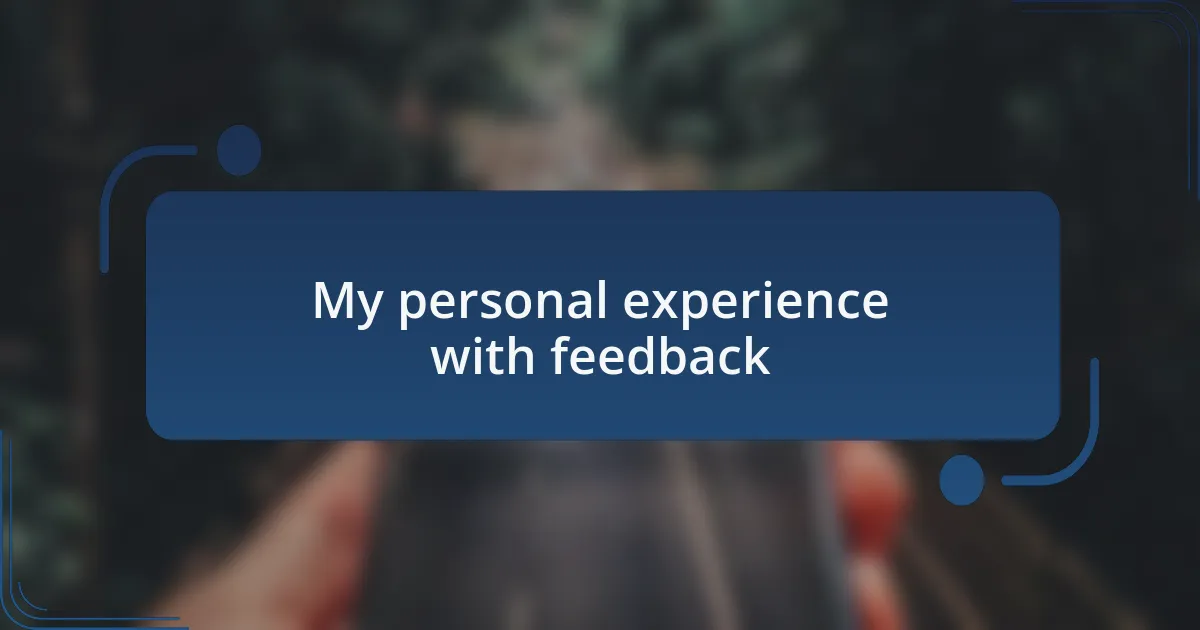
My personal experience with feedback
There was a time when feedback felt like a weight on my shoulders rather than a stepping stone. I vividly remember my first job, where a colleague pointed out some flaws in my project management skills. Initially, I felt a wave of defensiveness wash over me, but as I reflected on their comments later, I realized that the intention behind the feedback was to help me grow. That realization transformed my approach to receiving feedback from one of fear to one of opportunity.
Another unforgettable moment came during a team collaboration where I presented an idea that didn’t land well. A peer candidly critiqued my approach, and at first, those words stung. However, I began to understand that their honesty came from a desire for group success. By embracing that discomfort and seeking their perspective on how to improve, I not only learned to refine my ideas but also strengthened our working relationship. Have you ever found that being vulnerable in the face of feedback can lead to unexpected growth?
Looking back, I see that feedback has often been my best teacher. One instance stands out: I received input from a mentor about my public speaking. Initially, I felt anxious and even questioned my abilities. Yet, after incorporating their suggestions and practicing, I began to see a noticeable improvement. This experience taught me that the journey toward growth is often paved with constructive feedback—something I now welcome with open arms. How has your relationship with feedback evolved over time?
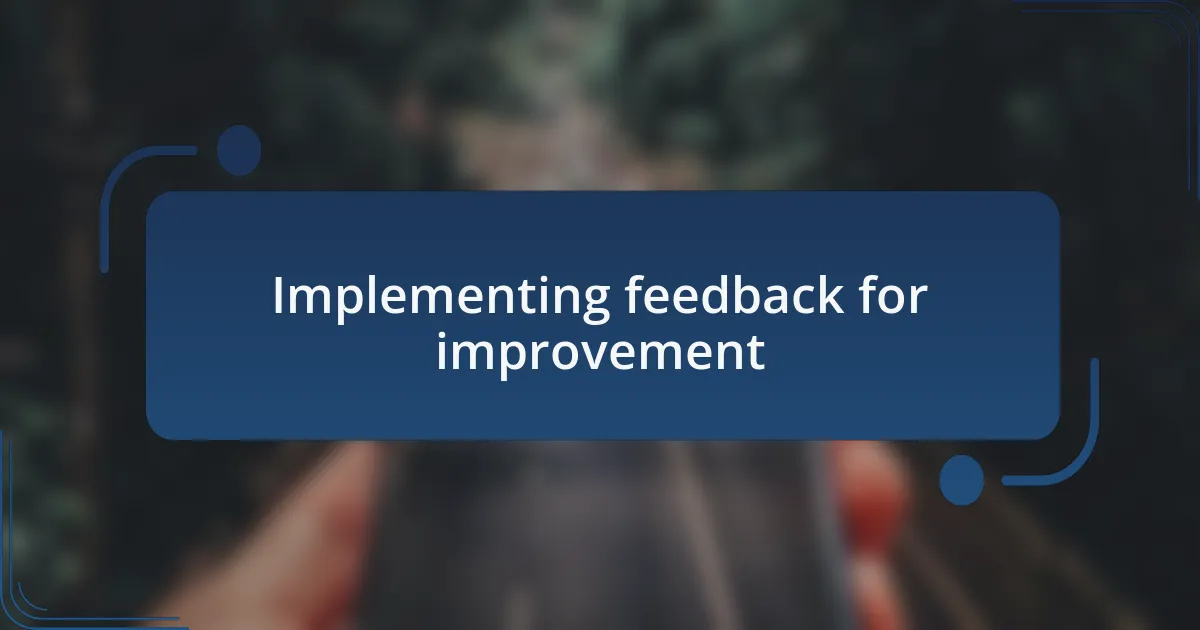
Implementing feedback for improvement
When I first started implementing feedback, it felt like a daunting process. I remember receiving suggestions on my writing style, where an editor highlighted areas of improvement. At that moment, I had to put my pride aside and remind myself that every critique was merely a step toward honing my craft.
As I embraced feedback, I noticed a shift in my mindset. For instance, one time, a team leader pointed out that my presentations lacked clarity. Instead of feeling defeated, I asked for specific examples of what they meant. This interaction not only provided clarity but also fostered a collaborative atmosphere where feedback became a shared journey, enhancing my skills along the way. Have you ever thought about how asking for clarification can transform vague criticism into tangible steps for improvement?
One memorable experience was when I sought feedback from a trusted friend on my networking skills. After their honest assessment, I felt a mix of disappointment and determination. Their insights pushed me to practice more and refine my approach, leading to noticeable progress in my interactions. This experience underscored the idea that implementing feedback is not just about acknowledging it; it’s about actively using it to fuel personal growth. How willing are you to embrace such a challenge in your life?